This post may contain affiliate links. Read more at our disclosure policy.
This guide will walk through How To Grill a Perfect Steak every time on any grill. One of the most common questions we get as caterers is How to Grill a Steak to perfection. The answer is, it’s easy! Learn how.
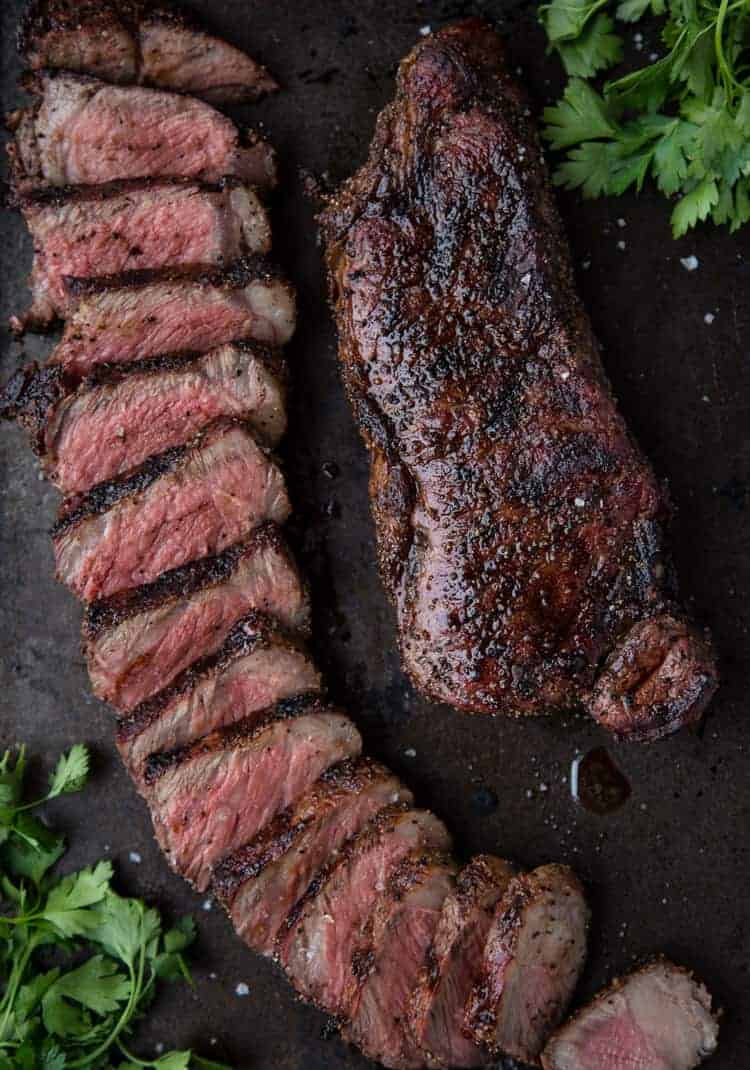
As the owners of a catering company, we often like to set up an interactive grill station at events so people can watch us working on our smokers and grills, and have the opportunity to talk to our guests and provide them with tips and tricks they can take home. One common thing everyone wants to know is foolproof ways to cook a great steak. Below is what we tell our guests.
Table of Contents
What is Grilling?
Grilling is cooking protein over high heat to sear the outside and bring the internal temperature up to your desired finishing temperature. Temperature ranges are typically 400 – 600 degrees Fahrenheit (F).
Through a high heat sear, a crust is formed while the interior retains moisture and tender using Maillard Reaction. Maillard reaction is a chemical reaction that browns food (whether using a grill or a cast iron pan). The best way to get the browning is with high heat, and a dry or minimally oiled protein.
Smoking is cooking with lower heat, typically under 300 degrees F. Another great method for steak is reverse sear which combines smoking at a low heat and then grilling it at the end to finish it off with a sear. Learn more about the reverse sear method as a great alternative to straight grilling.
Tools Needed for Perfect Grilled Steak
- Charcoal or Gas Grill that can get hot for the initial sear.
- Instant read digital thermometer, like the Thermoworks Thermapen, to monitor the internal temperature of the meat and avoid overcooking.
- Long tongs to be able to move the steak and avoid flare ups that burn the steak.
Grilling on pellet grills – If you have a pellet grill it’s still possible to sear a steak. The best method is to get the pellet grill as hot as it will go. Use infrared grill grates or a cast iron pan that warms up as the grill warms up to get the sear quickly and avoid overcooking.
Best Steak Cuts for the Grill
Lean Cuts – These have less intramuscular fat and are not as prone to flare ups (i.e. flames that are triggered by fat dropping on the charcoal). They also cook faster, so attention to the internal temperature of the steak is important.
- Filet Mignon
- Top Sirloin Filet
- Petite Sirloin
Marbled Cuts – These have more intramuscular fat and have amazing texture and flavor from the marbling. These cuts are also more prone to flare ups, so be aware of that potential when grilling these cuts.
- Ribeye
- New York Strip, or Striploin
- T-Bone
- Porterhouse
Chef’s Tip
Chef’s Tip – Buy a thick cut steak (or a steak that is greater than 1 1/2 inches thick) for best results. A thin steak can easily overcook, and having the thicker cut will make it easier to keep the interior tender.
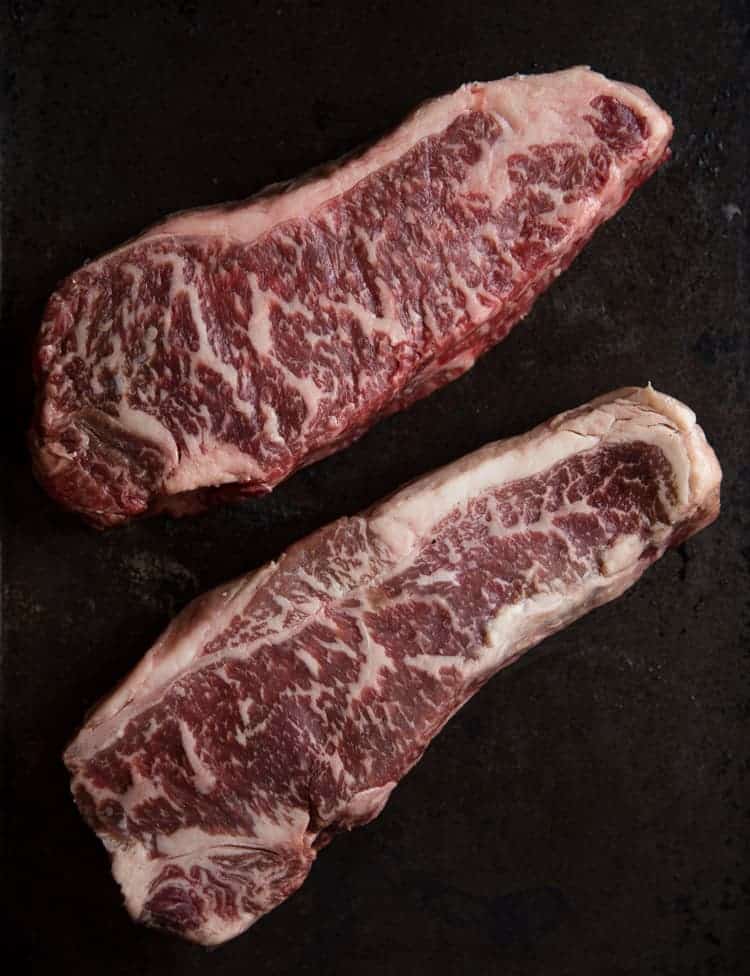
Seasoning
You will get infinite answers as to the best steak seasoning. Anytime we try a new steak source we always default to our SPG seasoning which is kosher salt, granulated garlic (versus garlic powder), and coarse black pepper.
You can use a store bought version, just avoid anything that has sugar which can get bitter if burned over a high heat. Or you can use our beef rub which is salt and herbs. A great savory flavor.
If you want complex flavors our steak seasoning adds herbal flavors, salt, and two unique ingredients to really pull out savory notes. These are anchovy powder and mushroom powder.
Plan 1 tablespoon of seasoning for each steak. The goal is to dry brine the steak to allow for flavor inside the meat as much as outside. We recommend a minimum of one hour seasoned, ideally 24 hours.
Portion Sizes – How Much Steak Per Person
We like to plan 3/4 pound of steak per person, pre-cook weight, for a dinner portion. Which means we’ll look at 3 pounds of steak for four people. After it’s cooked, we slice the steaks and then add slices to individual plates.
How to Grill A Perfect Steak
- Preheat the grill. If using a charcoal grill, use a two-zone method or direct/indirect. This allows the steak sear to occur and then finish the steak over indirect heat and avoid burning. We recommend lump charcoal for both flavor and heat.
- Trim excess fat if needed and pat dry before seasoning. The dry steak makes the browning or sear much easier and is key to a perfect grilled steak.
- Lightly oil the steak with olive oil and season simply with our SPG seasoning.
- Grill Direct: Place the steak for 3 – 4 minutes over the direct heat to sear and then flip. Continue cooking the other side for an additional 3 – 4 minutes to sear.
- Grill Indirect: Move the steak to the indirect side to finish cooking for an additional 8 – 12 minutes depending on how done you like your steak.
- Remove steak from heat and let the steak rest 10 minutes. The resting is important because the cells of the meat have expanded due to the grilling. As the cells cool, they contract and pull back in the juices and keep the steak moist and tender after slicing. It also accounts for carry over cooking, where the meat is still cooking toward the center of the cut for up to 5 minutes off the heat while resting.
- Slice against the grains depending on the steak and serve.
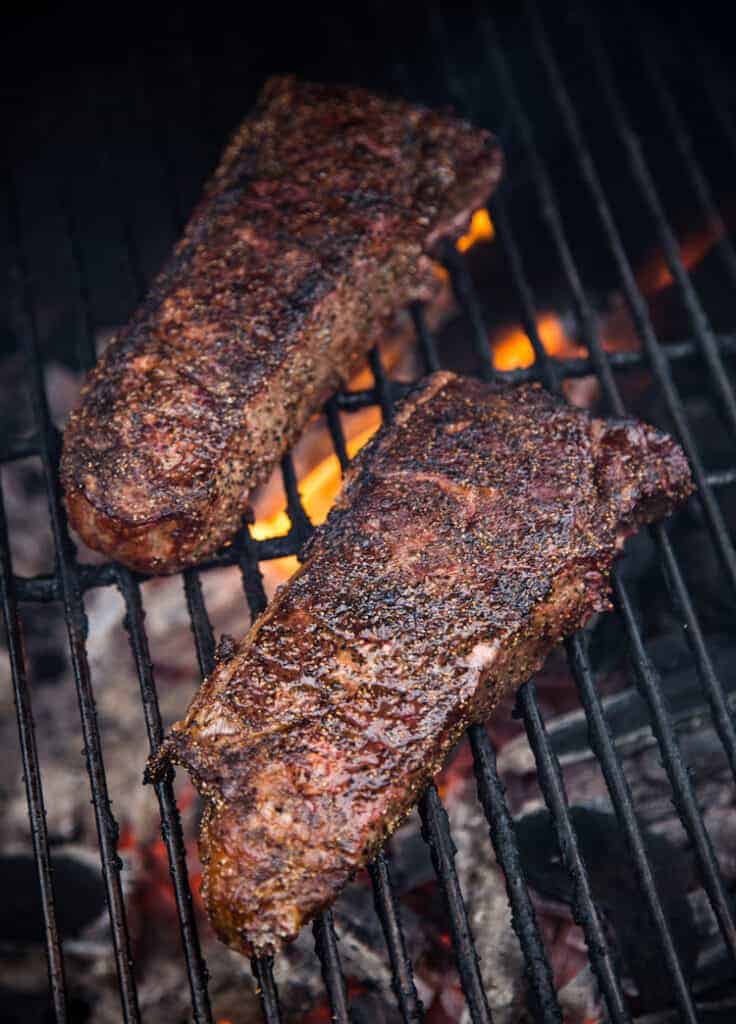
Would you like to save this?
Taking Temperature
Using an instant read thermometer like a Thermoworks Thermapen One, take the temperature by inserting the probe into the center of the cut and move the probe around. Remove the steak when the center of the cut or the coolest area you find is at the desired finishing temperature.
When Is Steak Done
Beef Temperature Ranges
Be sure to take into consideration the carry-over cooking that happens while the steak rests. For steaks remove them 5 degrees lower than your desired temperature. For roasts remove them 10 degrees lower. The steak’s internal temperature will rise as it rests.
| Black and Blue | 100 – 120° Fahrenheit (F) | 37 – 48° Celsius (C) |
| Rare | 120 – 130° F | 48 – 54° C |
| Medium Rare | 130 – 140° F | 54 – 60° C |
| Medium | 140 – 150° F | 60 – 65° C |
| Medium Well (not recommended) | 150 – 160° F | 65 – 71° C |
| Well Done (not recommended) | 160 – 170° F | 71 – 76° C |
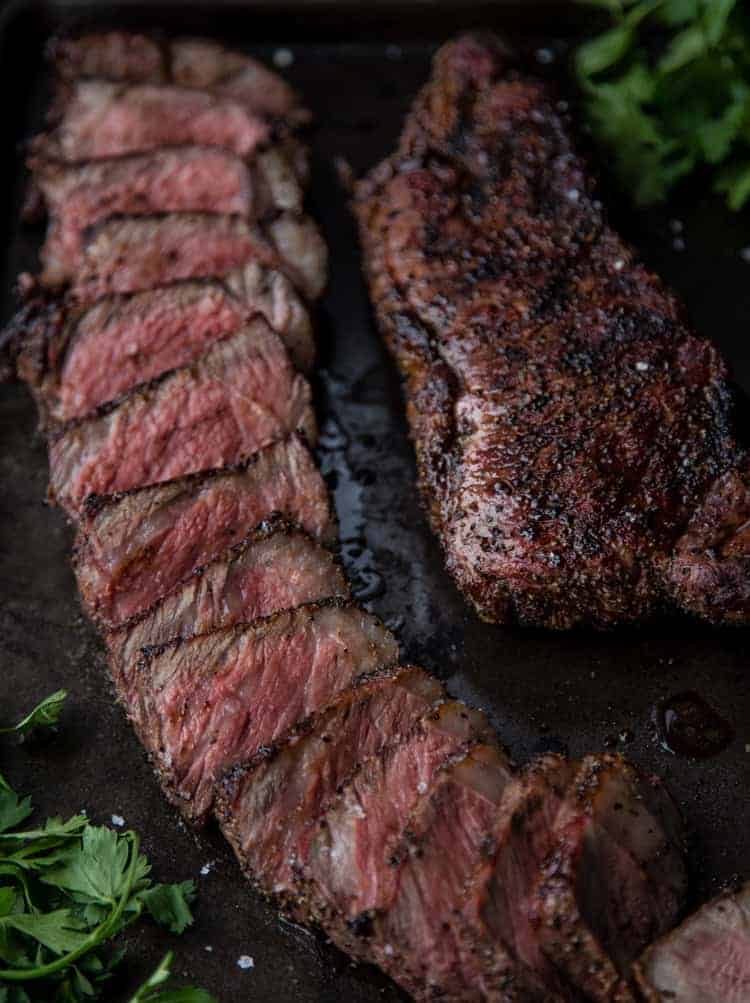
Wine Pairing For Steak
As a sommelier and wine writer, it’s no secret that we love pairing steak with wine. The general rule is the more fatty the steak the more tannic wine you want to pair. This fat complements the intensity that tannin adds to the wine.
If you are feeling adventurous try an Italian wine with steak like a Sangiovese. Or go classic with a Cabernet Sauvignon or Merlot. For leaner steaks, you can always go with unique pairings like a bigger style Pinot Noir. Yes, you can pair Pinot Noir with steak!
Other Great Grilled Steak Recipe Ideas
Check out our guide on the perfect steaks to grill or pick from some of our favorites.
- Filet Mignon with Mushroom Butter Sauce
- Picanha Steak with Mushroom Cream Sauce
- Bavette Steak with Whiskey Peppercorn Sauce
- Reverse Seared Ribeye Steak
Side Dish Ideas For Steak
Pick from any of our side recipes for steak or from some of our favorites.
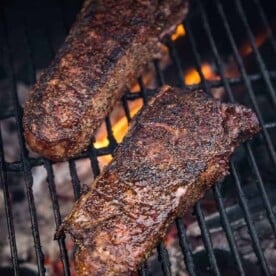
How To Grill Steak Perfectly Every Time
Ingredients
- 3 pounds NY Strip steaks
- ½ tablespoon extra virgin olive oil
- 3 tablespoons SPG Rub
Instructions
- Preparation: Set up and preheat the grill for two-zone or direct/indirect cooking. While the grill is warming up, trim excess fat off the steak (if needed) and pat dry with a paper towel. Lightly coat the steaks with olive oil and then season the steaks with salt and pepper.
- Grill Direct: Place the steak on the hot grill (targeting 500 degrees over the direct heat) and sear over direct heat for 3 – 5 minutes or until you see the browning occur. Flip the steak over and cook the other side over direct heat for additional 3 – 5 minutes or until you see your desired crust develop.
- Grill Indirect: Move the steak to indirect heat and continue cooking, with grill closed, for additional 8 – 10 minutes or until the steak reaches 125 degrees for rare or your desired finishing temperature.
- Rest: Let the steak rest for 10 minutes and then slice against the grain and serve.
Nutrition
Nutrition information is automatically calculated, so should only be used as an approximation.
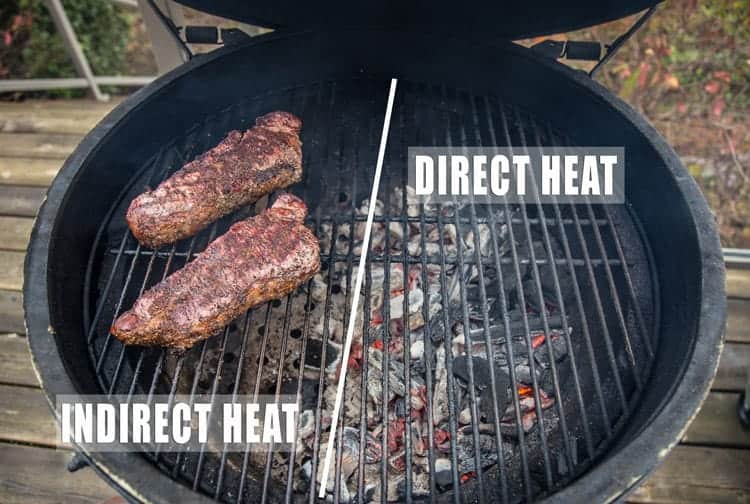


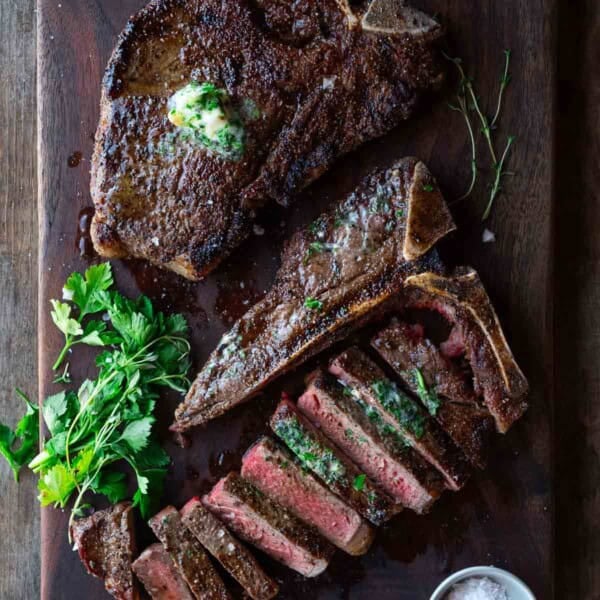
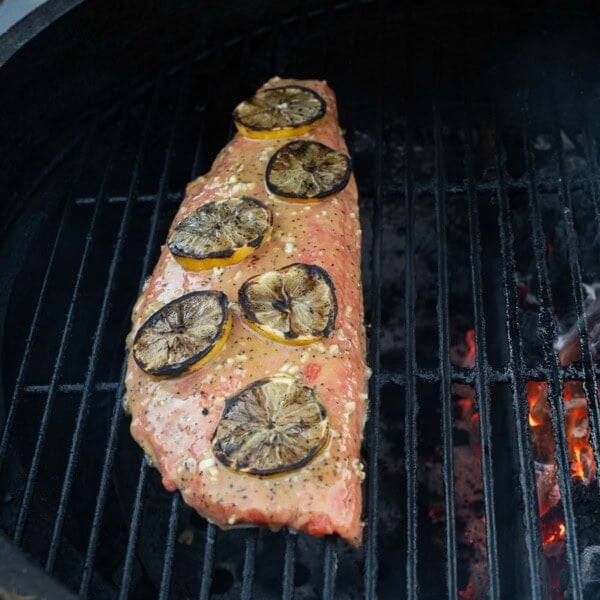
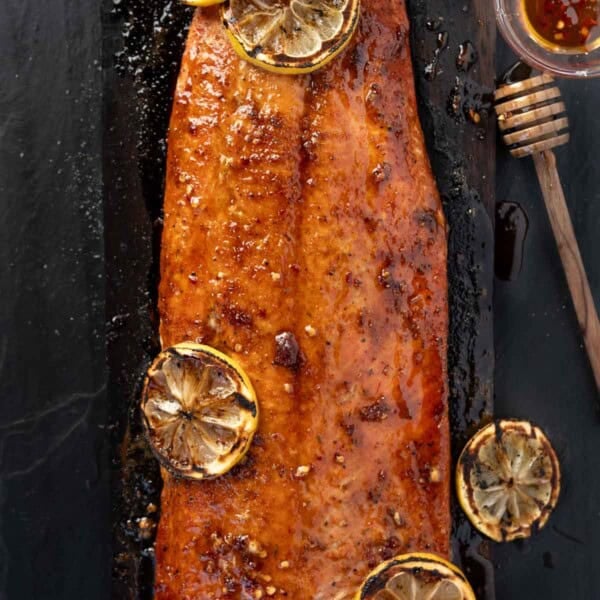
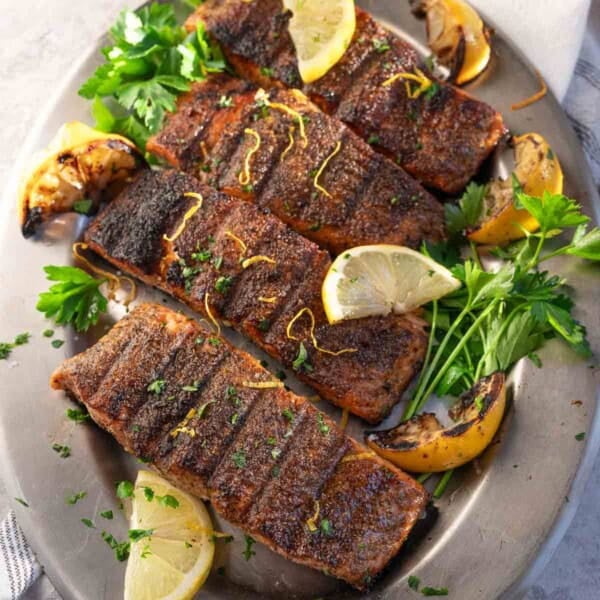
















I’m sure you can turn out a great steak using this method. I have. But then, a number of years ago, I discovered the reverse sear and find it far more consistent and easier for those of us who aren’t turning out a lot of steaks on a regular basis. I’m wondering why you don’t use the reverse sear as your method and consider this the best method instead?
We do mention reverse sear as an option for flavorful steaks and a link to our technique. And we agree, 90% of the time we do this by smoking first and then finishing hot and fast. But this article was also written for those who were looking for the best way to grill a steak.